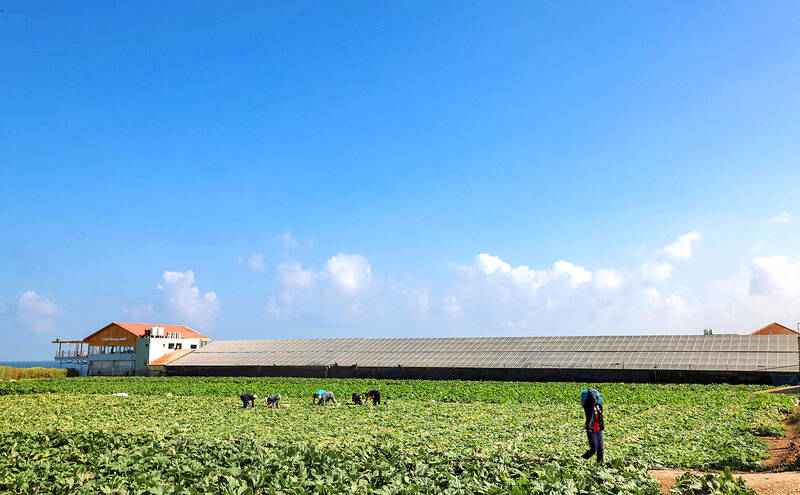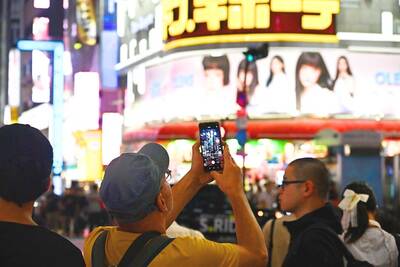Palestinians living in the Israeli-blockaded enclave of Gaza have long endured an unstable and costly electricity supply, so Yasser al-Hajj found a different way: solar power.
Looking at the rows of photo-voltaic panels at his beachfront fish farm and seafood restaurant, The Sailor, he said the investment he made six years ago had more than paid off.
“Electricity is the backbone of the project,” al-Hajj said, standing under a blazing Mediterranean sun. “We rely on it to provide oxygen for the fish, as well as to draw and pump water from the sea.”

Photo: AFP
The dozens of solar panels that shade the fish ponds below have brought savings that are now paying to refurbish the business, he said.
Al-Hajj said he used to pay 150,000 shekels (US$42,000) per month for electricity, “a huge burden,” before solar power slashed his monthly bill to 50,000 shekels.
For most of Gaza’s 2.3 million residents, living under Hamas Islamist rule and a 15-year-old Israeli blockade, power cuts are a daily fact of life that impact everything from homes to hospital wards.
While some Gazans pay for a generator to kick in when the mains are cut — for about half of each day, according to UN — more people are turning to renewable energy sources.
From the rooftops of Gaza City, solar panels stretch out into the horizon. Green energy advocates say it is a vision for a global future as the world faces the perils of climate change and rising energy costs.
Gaza bakery owner Bishara Shehadeh began the switch to solar this summer, by placing hundreds of gleaming panels on his rooftop.
“We have surplus electricity in the day,” he said. “We sell it to the electricity company in exchange for providing us with current during the night.”
Solar energy powers the bulbs illuminating the bustling bakery, but the ovens still run on diesel.
“We are working on importing ovens, depending on electrical power, from Israel, to save the cost of diesel,” Shehadeh said.
Both the bakery and the fish farm have relied partially on foreign donors to kick-start their switch to solar, although their owners are also investing their own cash.
However, in a poverty-stricken territory where nearly 80 percent of residents rely on humanitarian assistance, according to the UN, not everyone can afford to install renewable energy.
Around a fifth of Gazans have installed solar power in their homes, according to research published in April by the Energy, Sustainability and Society journal.
Financing options are available for Gazans with some capital. Shehadeh got a four-year loan to fund his bakery project.
At MegaPower, a store selling solar power kits, engineer Shehab Hussein said prices start at around US$1,000 and can be paid in installments. Clients included a sewing factory and a drinks producer, which see the mostly Chinese-made technology as “a worthwhile investment,” he said.
Raya al-Dadah, head of the University of Birmingham’s Sustainable Energy Technology Laboratory, said her family in Gaza has been using simple solar panels that heat water for more than 15 years.
“The pipe is super rusty, the glass is broken ... I just had a shower and the water is super hot,” she said during a visit to the territory.
However, al-Dadah encountered obstacles when she tried to import a more sophisticated solar power system for a community project in Gaza, where imports are tightly restricted by Israel and Egypt.
“Bringing them to the Gaza Strip has proved to be impossible,” she said.
The advanced setup includes more efficient panels and equipment that tracks the sun’s path.
Such technology is being used by Israeli firms such as SolarGik, whose smart control systems factor in weather conditions and can harness up to 20 percent more energy than standard panels, chief executive Gil Kroyzer told AFP.
Across the frontier in Gaza, in the absence of such high-tech equipment, al-Dadah relies on the standard panels to power a women’s center and surrounding homes in the strip’s northern Jabalia area.
Despite the challenges, al-Dadah said solar energy remains a “brilliant” option for Gaza, with its copious sunlight.
“It is really a very promising energy source, and it’s available everywhere,” she said.

BRUSHED OFF: An ambassador to Australia previously said that Beijing does not see a reason to apologize for its naval exercises and military maneuvers in international areas China set off alarm bells in New Zealand when it dispatched powerful warships on unprecedented missions in the South Pacific without explanation, military documents showed. Beijing has spent years expanding its reach in the southern Pacific Ocean, courting island nations with new hospitals, freshly paved roads and generous offers of climate aid. However, these diplomatic efforts have increasingly been accompanied by more overt displays of military power. Three Chinese warships sailed the Tasman Sea between Australia and New Zealand in February, the first time such a task group had been sighted in those waters. “We have never seen vessels with this capability

A Japanese city would urge all smartphone users to limit screen time to two hours a day outside work or school under a proposed ordinance that includes no penalties. The limit — which would be recommended for all residents in Toyoake City — would not be binding and there would be no penalties incurred for higher usage, the draft ordinance showed. The proposal aims “to prevent excessive use of devices causing physical and mental health issues... including sleep problems,” Mayor Masafumi Koki said yesterday. The draft urges elementary-school students to avoid smartphones after 9pm, and junior-high students and older are advised not

Philippine President Ferdinand Marcos Jr has fired his national police chief, who gained attention for leading the separate arrests of former Philippine president Rodrigo Duterte on orders of the International Criminal Court and televangelist Apollo Carreon Quiboloy, who is on the FBI’s most-wanted list for alleged child sex trafficking. Philippine Executive Secretary Lucas Bersamin did not cite a reason for the removal of General Nicolas Torre as head of the 232,000-member national police force, a position he was appointed to by Marcos in May and which he would have held until 2027. He was replaced by another senior police general, Jose

POWER CONFLICT: The US president threatened to deploy National Guards in Baltimore. US media reports said he is also planning to station troops in Chicago US President Donald Trump on Sunday threatened to deploy National Guard troops to yet another Democratic stronghold, the Maryland city of Baltimore, as he seeks to expand his crackdown on crime and immigration. The Republican’s latest online rant about an “out of control, crime-ridden” city comes as Democratic state leaders — including Maryland Governor Wes Moore — line up to berate Trump on a high-profile political stage. Trump this month deployed the National Guard to the streets of Washington, in a widely criticized show of force the president said amounts to a federal takeover of US capital policing. The Guard began carrying